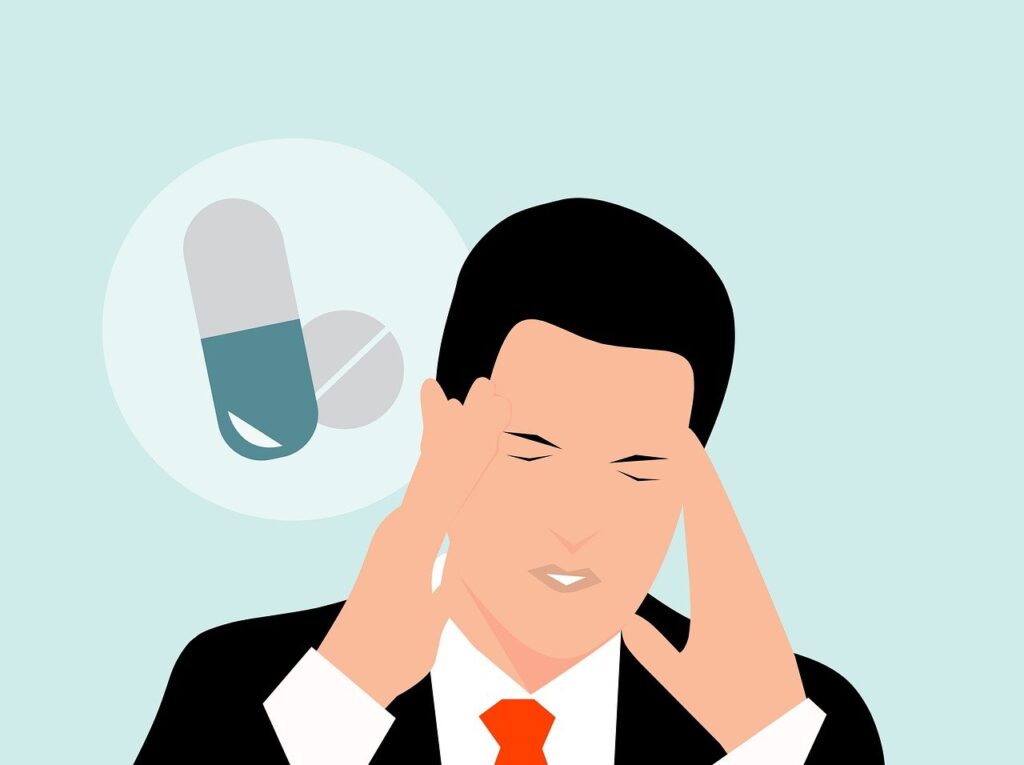- Beta blockers have been used to manage public speaking anxiety by blocking stress hormones and beta receptors in the body.
- Cognitive Behavioral Therapy (CBT), mindfulness techniques, breathing exercises, and natural supplements can be effective alternatives for managing performance anxiety.
- Adequate preparation and practice, building confidence through positive self-talk, and utilizing support systems are essential tips for successful public speaking without beta blockers.
Public speaking can be a daunting prospect for many, with the fear of judgment and failure looming large. Beta blockers have gained popularity as a solution for managing public speaking anxiety. But are these medications truly the answer? In this blog post, we will take a comprehensive look at the use of beta blockers for public speaking anxiety, their effectiveness, safety concerns, and possible alternatives to ensure you make an informed decision about whether this option is right for you.
Understanding Beta Blockers for Public Speaking

Performance anxiety, also known as stage fright or simply “anxiety”, is a common yet debilitating experience for millions of individuals. Symptoms typically arise from fear of being judged negatively despite there not necessarily being any evidence to validate the apprehension. Physical manifestations such as sweating profusely, an elevated heart rate and blood pressure, dizziness and nausea are all likely symptoms associated with performance anxiety.
Thankfully, beta blockers can be employed to assist those grappling with this unnerving experience by regulating stress response and reducing the intensity of reactions while performing under pressure. Beta-blockers work to inhibit nerve impulses that cause these various performance anxiety symptoms allowing the individual greater control over how they express themselves on stage without concern for judgemental opinions – either real or imagined.
The Role of Beta Blockers in Managing Anxiety
Beta blockers, specifically Propranolol, function by slowing down the heart rate and reducing the force of the heartbeat, thereby reducing the amount of work the heart has to do. This has a calming effect on the body, making it an effective tool for those who suffer from severe anxiety during public speaking or performances. Unlike benzodiazepines, which work by sedating the brain and altering its chemical balance, Propranolol works on the physical responses of the body to anxiety, such as trembling hands, sweating, and rapid heartbeat. This makes it a unique solution for those who primarily suffer from physical symptoms during their performances.
Common Beta Blockers for Anxiety
Propranolol, a beta-blocker known for treating performance and social anxiety on an off-label basis, can be effective in reducing short term stress related to events. To take advantage of this prescription drug’s benefits, patients are required to obtain it through their doctor and it typically requires up to an hour before effects become presentable enough to be observed.
Assessing the Effectiveness of Beta Blockers for Public Speaking

Studies have shown that beta blockers, such as Propranolol, can help control the physical impacts of public speaking anxiety. This is due to them blocking hormones in the sympathetic nervous system responsible for causing these types of anxieties when presenting publicly. They are not able to address fears and worries stemming from psychological causes regarding public speaking or other performance-related situations like exams where nerves may be more apparent.
Propranolol has been seen successful in treating stage fright along with problems related to examinations concerning tension and apprehension based on results found during investigations conducted by multiple sources.
Potential Benefits
Beta blockers are associated with a range of positive effects, such as preventing the heart from overworking and normalizing sympathetic activity. They also help decrease blood pressure and reduce physical symptoms connected to anxiety, making them useful for public speaking situations where people may experience feelings of unease or panic. By blocking beta receptors in individuals prone to anxiety during these types of events, they can feel calmer and more secure knowing that their physiological responses will be under control.
Limitations and Drawbacks
The continued use of beta blockers can cause a person to become dependent on them and could increase the likelihood of an unexpected rise in blood pressure if suddenly discontinued. This dependency can develop subtly over time, with the individual becoming gradually more reliant on the medication to manage their anxiety, rather than developing coping mechanisms and strategies to naturally handle their fears. These medications cannot provide help for psychological anxiety, and their sedative quality may make it difficult to remain alert – a potential hindrance when performance is called for.
This means that while beta blockers can alleviate the physical symptoms of anxiety, they do not address the root cause of the fear or anxiety. Therefore, individuals may still experience feelings of unease, nervousness, or dread, even while on the medication.
Safety and Side Effects of Beta Blockers

When taking Propranolol for public speaking anxiety, it’s important to understand the potential risks associated with its regular use. It is advisable not to consume alcohol while on this drug, as doing so may result in reduced blood pressure and cause feelings of lightheadedness or drowsiness. Dry eye syndrome could be one potential side effect connected with using Propranolol regularly for anxiety related to giving presentations.
Common Side Effects
When using beta blockers, it is fairly common to feel exhausted and have sleeping problems with decreased energy levels. This may be attributed to the fact that these medications reduce melatonin production – which regulates sleep – or due to their capacity of diminishing blood pressure. The extent of these effects will vary from person to person and will also depend on the type and dosage of the beta blocker administered.
Precautions and Contraindications
Beta blockers are not a suitable option for people with moderate to severe asthma, symptomatic bradycardia, AV block or decompensated heart failure. These medications should be avoided if the patient has any form of bronchospasm. When using beta-blockers, it’s critical to be aware of potential interactions with other drugs, including those for high blood pressure and heart disease. It’s recommended to avoid consuming alcohol and caffeine-based products while taking this medication, as they may amplify certain side effects like low blood pressure and symptoms of glaucoma in some individuals.
While beta blockers are generally deemed safe, certain health conditions may render them unsuitable. These include respiratory diseases, heart conditions, or states of low blood pressure. Therefore, it’s crucial to consult with a healthcare professional before deciding to use these medications in any capacity.
Alternatives to Beta Blockers for Public Speaking Anxiety

Mindfulness techniques and breathing exercises can be helpful in managing stress levels and combating anxiety, making them viable natural substitutes for beta blockers. Cognitive Behavioral Therapy (CBT) is a form of therapy that puts an emphasis on changing detrimental behaviors or thought patterns to minimize public speaking anxieties by allowing those who struggle with it to progressively expose themselves more frequently while also interpreting their worries in different ways. With CBT as well as mindfulness strategies, facing your fear when regarding issues like stage fright may become much easier overall.
Cognitive Behavioral Therapy (CBT)
CBT is a type of psychotherapy with the aim to reduce anxiety levels by altering thoughts and behavior. Studies have shown that, particularly when adhered to for a longer period of time, this approach can be beneficial in treating various kinds of anxiety disorders. The beauty of CBT lies in its flexibility – it can be tailored to suit each individual’s unique circumstances and can be delivered in various formats, including individual therapy, group therapy, self-help books, and online courses. Moreover, the skills learned through CBT are lifelong, providing individuals with a lasting solution to their anxiety issues.
The lasting effects usually start to take shape after five to twenty sessions of CBT over several weeks or months.
Mindfulness Techniques and Breathing Exercises
Mindfulness practices and breathing routines can be employed to help manage stress and anxiety in the present moment. The practice of meditation has been found to modify brain functions in those grappling with depression, while mindfulness interventions have been proven to alleviate nerves associated with public speaking.
When it comes to delivering a speech or a public presentation, specific breathing techniques like the 4-7-8 method and box breathing can be extremely helpful. These techniques help to regulate your breathing, which in turn triggers a calming response in the body. This leads to a decrease in heart rate and muscle tension, ultimately giving you better control over your anxiety before you step onto the stage.
The 4-7-8 method, for instance, requires you to inhale for 4 seconds, hold your breath for 7 seconds, and exhale for 8 seconds. This slows down your breathing and helps to lower your heart rate.
Box breathing, on the other hand, involves inhaling, holding your breath, exhaling, and holding your breath again, each for the count of 4. This technique not only reduces stress but also improves your focus and performance under pressure. By mastering these techniques, you can turn your anxiety into excitement and transform your public speaking experience.
Natural Supplements

When facing public speaking, natural supplements like PerformZen may help one feel tranquil and stay on track. Studies have indicated that this particular supplement can bring a sense of peace which helps to alleviate apprehension while also sharpening mental clarity. The ingredients of this supplement, including L-theanine – an amino acid commonly found in tea – work by elevating GABA levels in the brain, which in turn promotes the production of alpha waves and reduces beta wave patterns. This leads to enhanced relaxation.
Tips for Successful Public Speaking Without Beta Blockers
Taking the time to be prepared, developing self-assurance and having resources at hand can assist in delivering a successful speech without relying on beta blockers. Proper planning and an optimistic attitude are key components for success when it comes to public speaking – there is no need for medication as support.
Adequate Preparation and Practice

In preparation for a public speaking engagement, utilizing techniques such as humor, storytelling and articulate speech can be beneficial. Tips to follow include rehearsing the presentation multiple times, employing body language movements, approaching it with positivity and involving your audience from start to finish by narrating an interesting story in a conversational manner. Typically, these strategies necessitate about thirty hours of practice, or at least ten sessions, for the development of effective non-verbal communication. It’s important for each individual to discover the methods and techniques that best boost their confidence and allow them to excel in public speaking.
Building Confidence and Positive Self-Talk
Positive self-talk involves using positive expressions to increase your sense of worth, resulting in strengthened confidence. Visualization is another effective way for increasing assurance when it comes to public speaking.
Here’s a step-by-step guide to help you out:
- Visualize Your Successful Speech Delivery: Close your eyes and see yourself delivering your speech flawlessly from start to finish. Imagine the words flowing smoothly, your voice resonating with conviction, and your body language exuding confidence.
- Picture Yourself Standing Confidently on Stage: Visualize yourself standing tall and confident on the stage. Feel the warmth of the spotlight, the firmness of the podium, and the energy of the audience.
- Foresee the Audience’s Positive Reactions: Anticipate the audience’s reactions to your speech. See their faces light up with understanding, hear their laughter at your jokes, and feel their applause reverberate through the room.
- Regular Practice: Make these visualization exercises a part of your daily routine. The more you practice, the more comfortable and natural they will become.
- Boost Your Self-Confidence: Each successful visualization session will boost your self-confidence, making you more prepared and less anxious about your upcoming public speaking engagement.
- Enhance Your Public Speaking Skills: Visualization not only boosts your confidence but also improves your public speaking skills by helping you anticipate and prepare for various scenarios on stage.
Keep in mind, repetition is the key to mastery. The more you engage in visualization, the more you will grow in confidence and readiness.
Utilizing Support Systems
Fear of public speaking can be managed with the help of various systems. Strategies such as taking part in practice sessions, relying on anti-anxiety medications and consulting a mental health expert or career coach for counseling can be beneficial. Joining support groups to obtain helpful tips and strategies from other individuals who have conquered this fear can also be effective.
Your loved ones can play a crucial role in helping you manage public speaking anxiety – offering useful feedback during preparation stages along with assurance that their presence will act as a pillar whenever needed can prove beneficial for both parties involved.
Summary
By focusing on preparation, boosting confidence and finding support systems for help, managing public speaking anxiety can be achieved without relying solely on beta blockers. Such medications may offer short-term benefits in controlling physical symptoms linked with such an anxious state. They should not replace other methods of addressing the issue at its core as it has limitations along with potential side effects to consider. It is possible to become a more confident speaker by utilizing these alternative strategies rather than just with beta blockers alone.
Which beta blocker is best for public speaking?
Inderal and its generic equivalent, Propranolol, are the most commonly prescribed beta blockers for performance anxiety. They work by blocking adrenaline to reduce physical symptoms associated with anxiety such as dizziness or rapid heartbeat which can help calm down before speaking in public.
What beta blocker is good for social anxiety?
Beta blockers like Propranolol and Atenolol are routinely recommended to assist in relieving signs of social anxiety disorders. These medications work by obstructing the production of stress hormones adrenaline and noradrenaline, reducing heart rate as well as other physical effects such as a racing pulse or shaking or perspiring due to nervousness.
Can anti anxiety help with public speaking?
It is common to feel anxious in a public speaking situation. Fortunately, propranolol and other calming medications prescribed by doctors can be taken one hour before the event to help manage any discomforting anxiety symptoms. By taking these steps, you can ensure a more comfortable and confident delivery of your speech.
What are beta blockers and how do they work?
Beta blockers are a form of medication that acts by inhibiting beta receptors in the body, minimizing the results of stress hormones and helping to ease physical symptoms associated with anxiety such as rapid heart rate or quivering hands.
What are some potential side effects of using beta blockers for public speaking anxiety?
Beta blockers, which are used to manage public speaking anxiety, can lead to side effects such as tiredness, difficulty sleeping and reduced energy levels along with a drop in blood pressure. Anxiety around giving presentations is common, but if managed carefully these medications have the potential to help lower anxiety.

